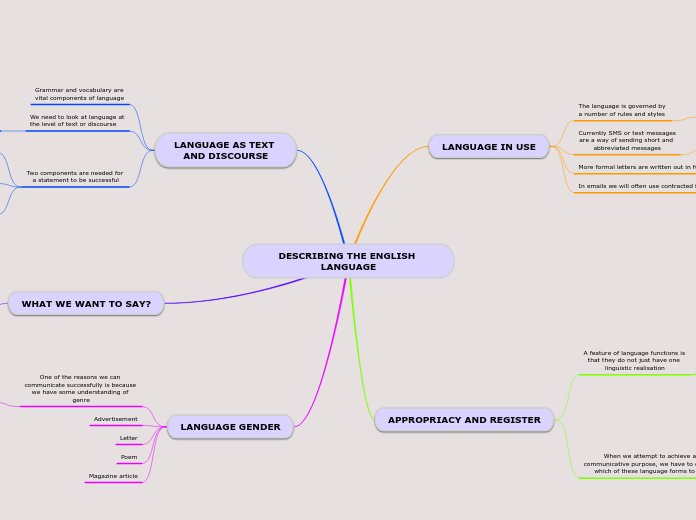DESCRIBING THE ENGLISH LANGUAGE
LANGUAGE IN USE
The language is governed by a number of rules and styles
Whether we're typing or talking, texting or emailing
Currently SMS or text messages are a way of sending short and abbreviated messages
For example: hence thx 4 = thanks for
More formal letters are written out in full
For example: Thank you very much for inviting me
In emails we will often use contracted forms
Ill be at your place at 8
APPROPRIACY AND REGISTER
A feature of language functions is that they do not just have one linguistic realisation
For example: Would you like to come to the cinema?
How about you come to the movies?
Do you fancy the cinema?
I was wondering if you'd like to come to the movies tonight
When we attempt to achieve a communicative purpose, we have to choose which of these language forms to use
Six of the variables which govern our choice
Setting
Participants
Gender
Channel
Topic
Tone
LANGUAGE AS TEXT AND DISCOURSE
Grammar and vocabulary are vital components of language
We need to look at language at the level of text or discourse
Texts that are longer than phrases or sentences
Two components are needed for a statement to be successful
Coherence
Cohesion
Lexical cohesion
Repetition of words and phrases
Grammatical cohesion
Use of pronouns
Order
WHAT WE WANT TO SAY?
The study of functions and how they are realised in language, has had a profound effect upon the design of language teaching materials
Making language purpose a major factor in the choice of syllabus items
Teaching techniques
LANGUAGE GENDER
One of the reasons we can communicate successfully is because we have some understanding of genre
A genre is a type of written organisation
and layout
Advertisement
Letter
Poem
Magazine article
